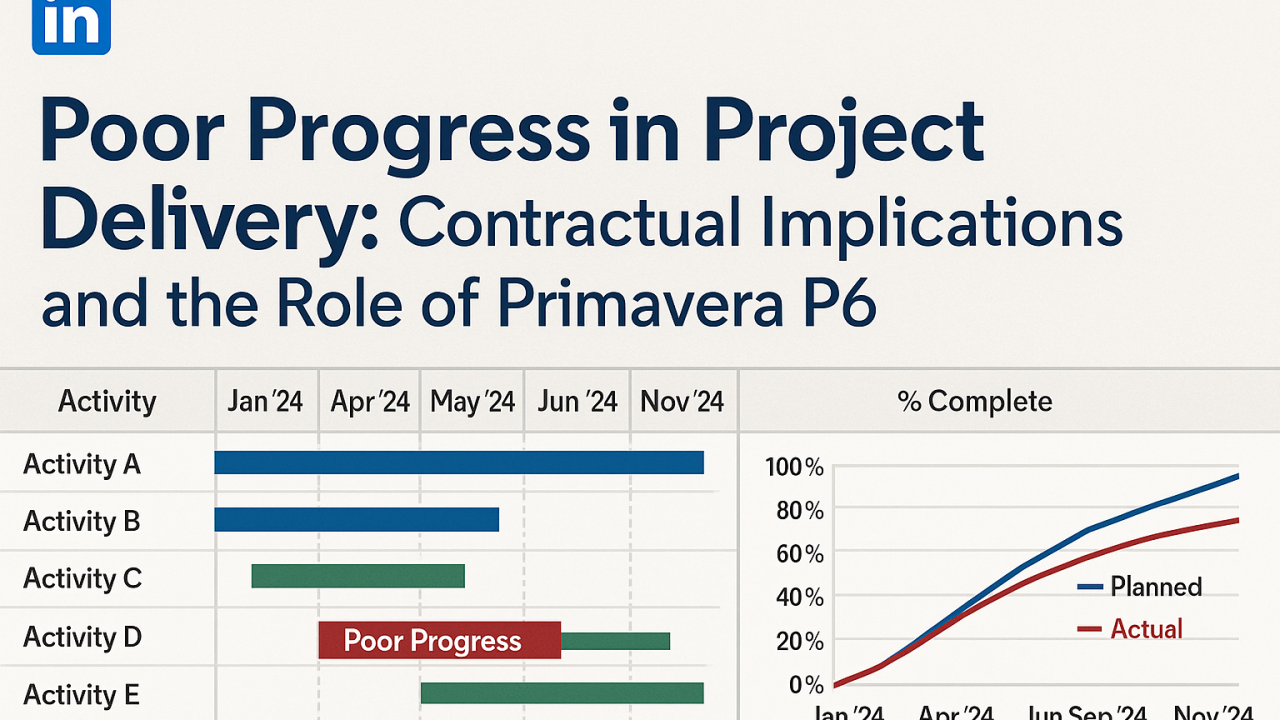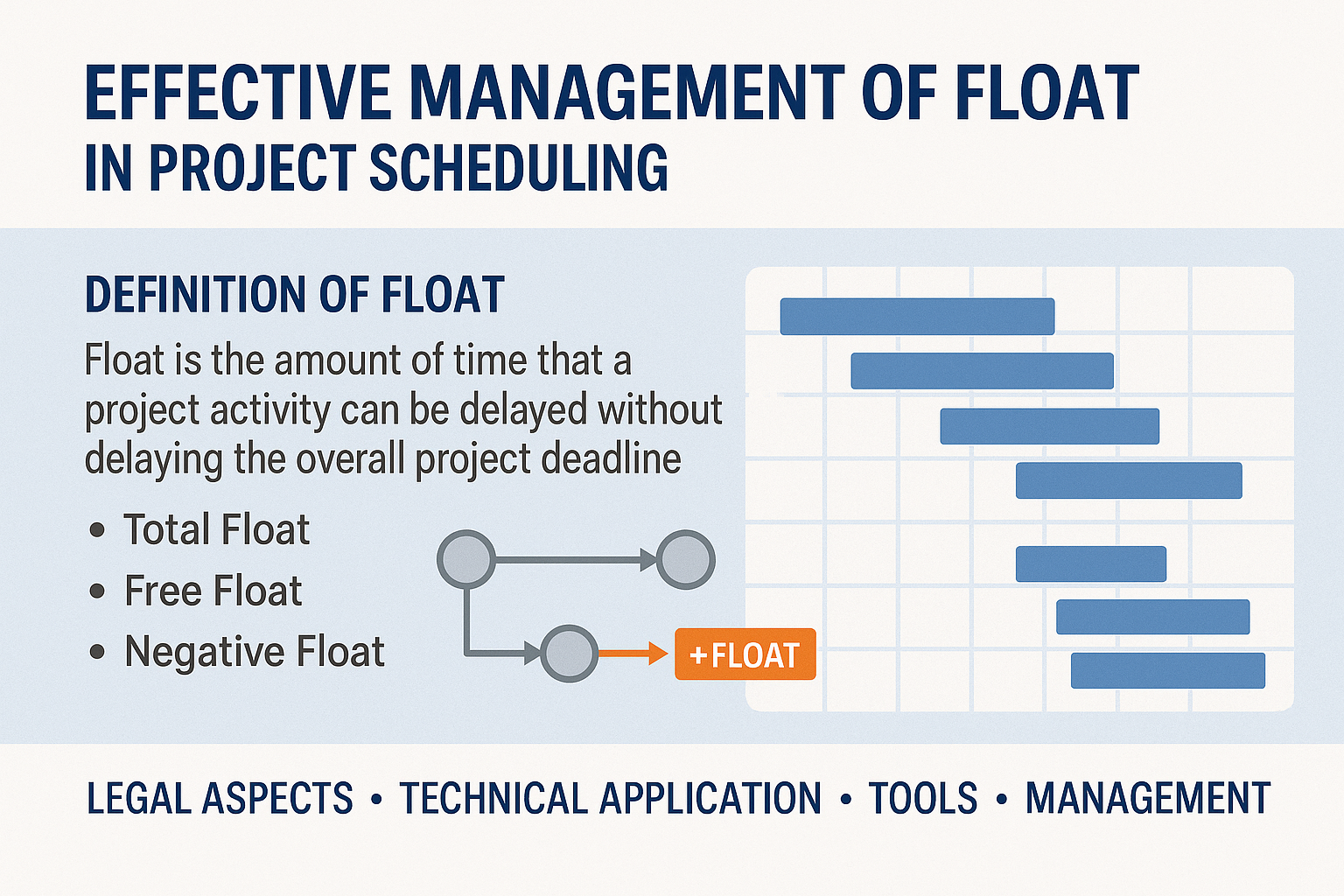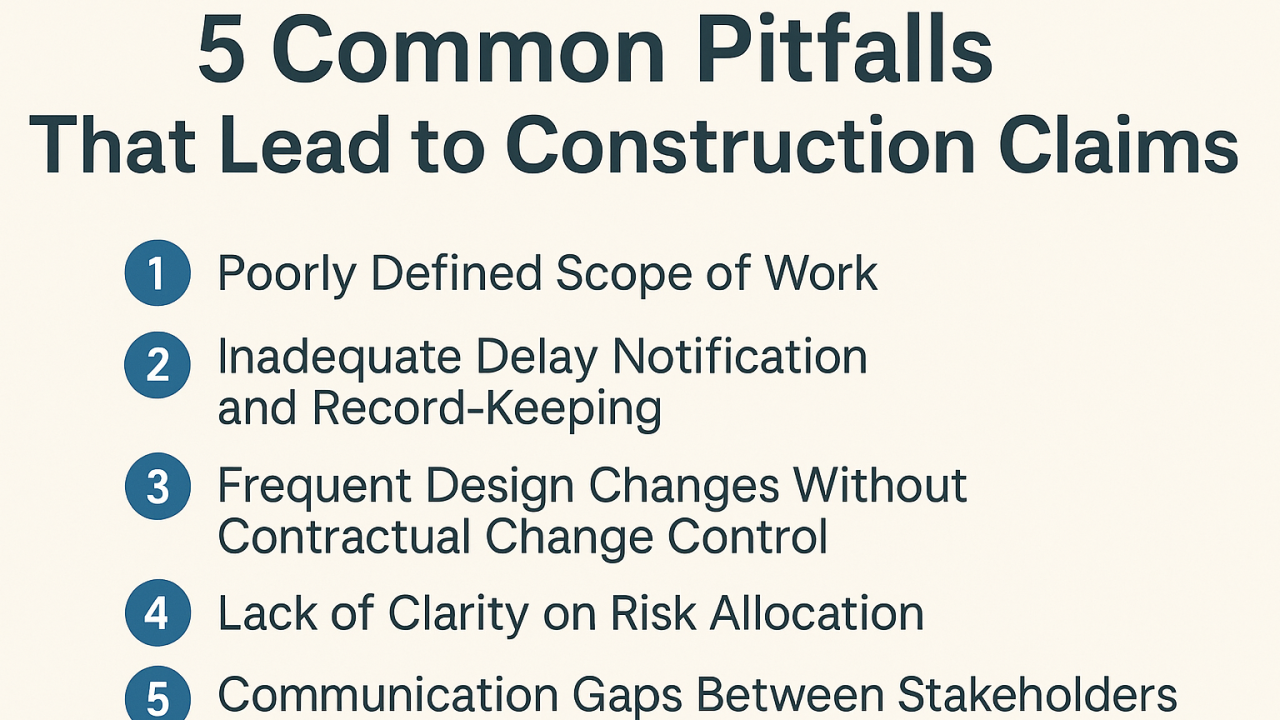Poor Progress in Project Delivery: Contractual Implications and the Role of Primavera P6
Introduction :
In complex projects—especially in engineering, construction, defense, and oil & gas—poor progress is a leading contributor to disputes, cost overruns, and schedule delays. The identification, management, and contractual handling of poor progress is a critical responsibility of both project owners and contractors. This article explores how poor progress is treated across different standard forms of contracts and how Primavera P6, the industry-standard scheduling software, serves as the analytical backbone in identifying and managing it.

In complex projects—especially in engineering, construction, defense, and oil & gas—poor progress is a leading contributor to disputes, cost overruns, and schedule delays. The identification, management, and contractual handling of poor progress is a critical responsibility of both project owners and contractors. This article explores how poor progress is treated across different standard forms of contracts and how Primavera P6, the industry-standard scheduling software, serves as the analytical backbone in identifying and managing it.
Understanding Poor Progress
Poor progress refers to the failure to achieve planned milestones or productivity levels, typically measured against an approved baseline schedule. It signals inefficiencies or delays that jeopardize the project’s timely completion.
Indicators of Poor Progress:
- Activities start late or not at all.
- % Complete falls significantly behind the planned progress curve.
- Remaining duration increases without justification.
- Negative or decreasing Total Float on critical/near-critical paths.
- Earned Value metrics such as SPI (Schedule Performance Index) drop below 1.0.
Poor Progress in Contracts: Obligations and Remedies
🧾 1. FIDIC Contracts (Red, Yellow, Silver Books)
FIDIC requires the Contractor to proceed with « due expedition and without delay. » Under Sub-Clause 8.6 (Programme) and Sub-Clause 8.7 (Delay Damages):
- Contractor must regularly update the program (typically in P6).
- Failure to maintain progress can lead to requests for a revised program or a formal notice of default.
- Persistent poor progress may be grounds for termination.
⚖️ 2. NEC4 Contracts
NEC4 emphasizes early warning and proactive communication. Under Clause 31 (Programme) and Clause 16 (Early Warning):
- The contractor must notify of conditions causing delay.
- Failure to keep the Accepted Programme updated results in loss of entitlement to compensation events.
- Frequent poor progress may be deemed a compensation event or even non-compliance.
🛠 3. AIA and ConsensusDocs (U.S. Contracts)
These contracts generally require:
- Submission of a Critical Path Method (CPM) schedule, often using Primavera P6.
- Regular updates with variance analysis.
- Owners may withhold payments, demand Recovery Schedules, or apply Liquidated Damages for delays.
🏗 4. EPC and Turnkey Contracts
High-risk, lump-sum turnkey contracts impose strict performance obligations:
- Contractors are required to maintain a baseline and adhere to fixed milestones.
- Non-performance leads to backcharges, retention releases being withheld, or even parent company guarantees being invoked.
Primavera P6: Managing and Demonstrating Progress
Primavera P6 plays a central role in substantiating progress or lack thereof. Its robust scheduling engine and forensic tracking capabilities make it the de facto tool for defending against claims or proving poor performance.
Tools in P6 to Detect Poor Progress:
Feature Application Baseline vs Current DatesIdentify slippage in start/finish dates. Progress Spotlight Highlights work expected in the current update period. Activity % Complete Types Duration, Physical, or Units to match contractual method. Float and Critical Path Analysis Shows if delayed activities affect project milestones. Earned Value Layouts Use SPI/CPI for performance diagnostics. Delay Analysis (TIA) Time Impact Analysis to evaluate delay responsibility.
Recovery Through P6:
When poor progress is detected, contractors must prepare:
- A Recovery Schedule showing how delays will be mitigated.
- What-If scenarios using resource loading and logic resequencing.
- Updated forecasts for manpower, cost, and equipment utilization.
Contractual and Practical Implications

Poor progress also impacts client confidence, supply chain coordination, and the overall risk profile of the project.
Best Practices to Manage Poor Progress
- Baseline Approval: Secure formal client acceptance of the baseline early.
- Frequent Updates: Maintain schedule updates (typically bi-weekly or monthly).
- Narrative Reporting: Explain slippage with contextual notes tied to schedule data.
- Transparent Change Control: Capture scope changes and rebaseline accordingly.
- Contractual Alignment: Ensure schedule logic reflects contractual milestones and responsibilities.
- Forensic Recordkeeping: Archive all P6 files, update logs, and progress snapshots.
Conclusion
« Poor Progress » is not merely a technical deviation—it is a contractual risk and project control signal. With the right tools, notably Primavera P6, and an understanding of how contracts define and respond to progress failures, project teams can stay compliant, proactive, and defendable.
To truly manage poor progress, organizations must build discipline into schedule updates, align project controls with legal obligations, and foster communication between field operations and planners. Only then can projects respond swiftly, recover effectively, and deliver successfully.
Our latest articles
Poor Progress in Project Delivery: Contractual Implications and the Role of Primavera P6
Poor Progress in Project Delivery: Contractual Implications and the Role of Primavera P6 Introduction : In complex projects—especially in engineering,…
Effective Management of Float in Project Scheduling: Definition, Legal Aspects, Technical Application, and Tools
Effective Management of Float in Project Scheduling: Definition, Legal Aspects, Technical Application, and Tools 1. Introduction : In project management,…
5 Common Pitfalls That Lead to Construction Claims
5 Common Pitfalls That Lead to Construction Claims Introduction : In complex construction projects, claims are not merely a risk…



